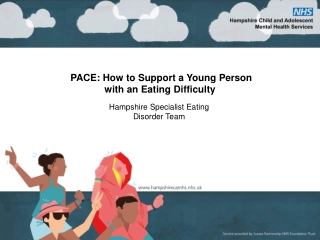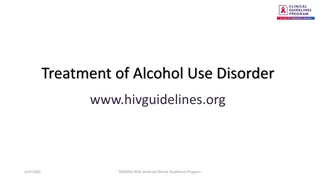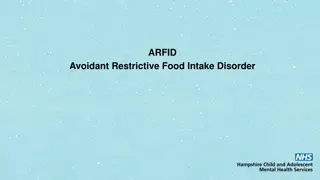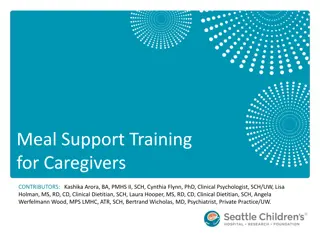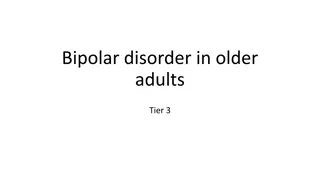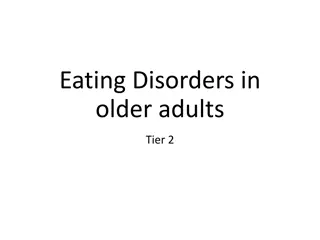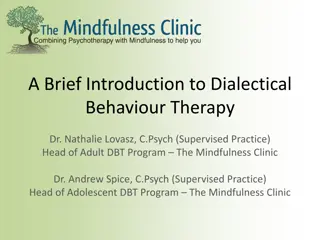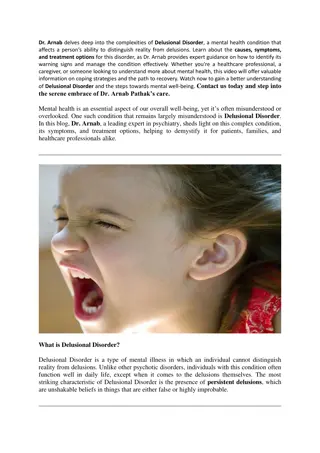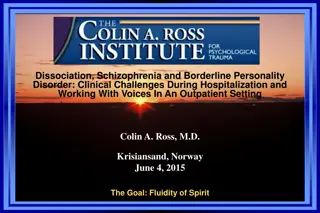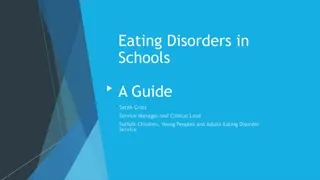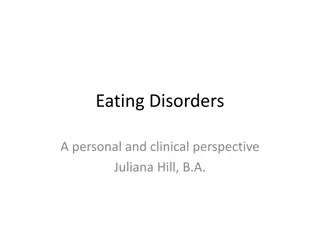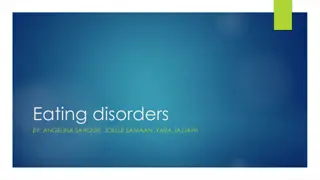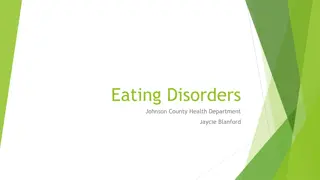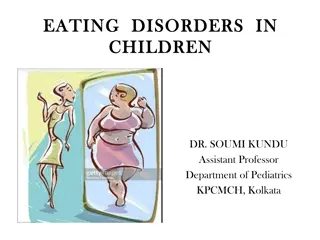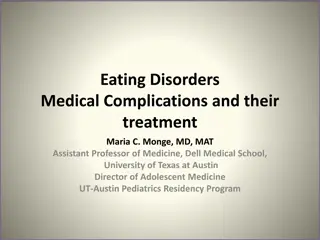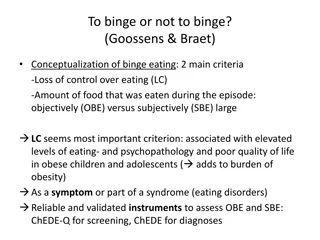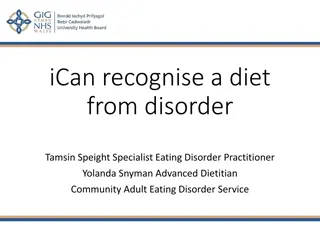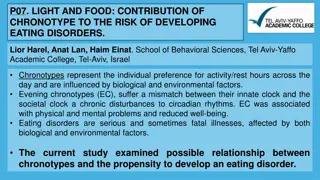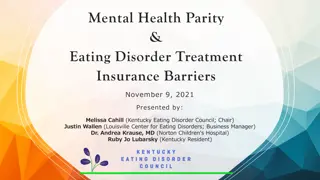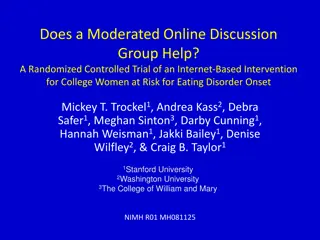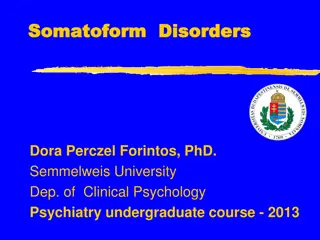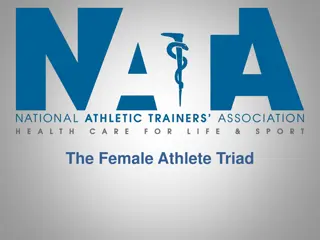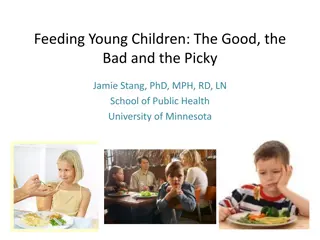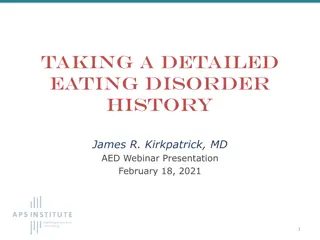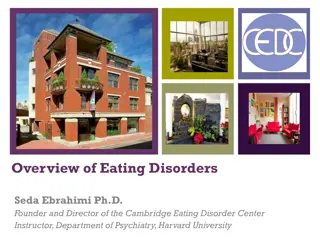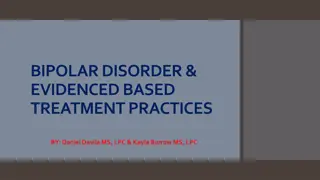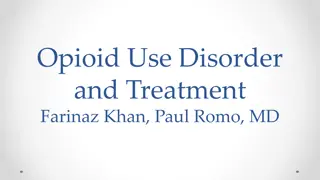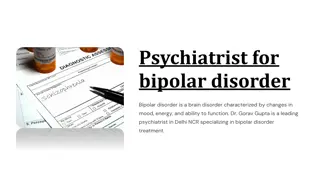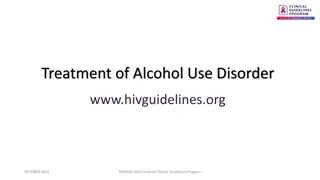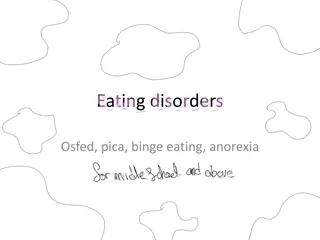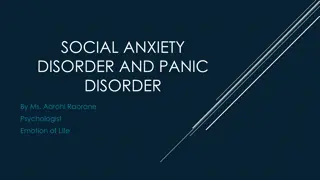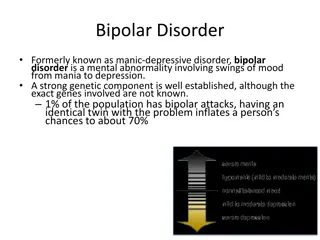Supporting Young People with Eating Difficulties
Learn how to provide effective support for young individuals facing eating challenges. Insights from Hampshire Specialist Eating Disorder Team.
1 views • 20 slides
Opioid Use Disorder Treatment Guidelines 2024
The February 2024 NYSDOH AIDS Institute Clinical Guidelines Program focuses on assisting clinicians in engaging with patients about opioid use disorder (OUD) treatment goals, emphasizing overdose prevention, providing updated information on available treatment options, and offering recommendations f
2 views • 24 slides
EXERCISE ADDICTION AND DISORDERED EATING IN ADOLESCENTS
A study led by Dr. Mia Beck Lichtenstein introduces the Exercise Addiction Inventory for Youth (EAI-Y) to assess exercise addiction in adolescents, particularly those with disordered eating. The research aimed to validate the EAI-Y, estimate the prevalence of exercise addiction in active adolescents
2 views • 10 slides
Understanding Anxiety Disorders and Related Conditions
Explore the distinguishing features of anxiety disorders such as generalized anxiety disorder, panic disorder, and phobias, along with insights into obsessive-compulsive disorder (OCD) and posttraumatic stress disorder (PTSD). Delve into the impact of conditioning, cognition, and biology on these co
2 views • 46 slides
Guidelines for Treatment of Alcohol Use Disorder
These guidelines aim to increase the number of clinicians offering evidence-based treatment for individuals with Alcohol Use Disorder (AUD), engage more New York State residents in treatment, reduce alcohol-related deaths, and promote a harm reduction approach. They address the prevalence of binge a
1 views • 18 slides
Understanding ARFID: A Guide to Avoidant Restrictive Food Intake Disorder
Avoidant Restrictive Food Intake Disorder (ARFID) is a feeding and eating disorder characterized by significant weight loss, nutritional deficiency, and psychosocial impairment. Individuals may experience sensory sensitivity, lack of interest, or fear of aversive consequences. ARFID differs from pic
0 views • 18 slides
Essential Meal Support Training for Caregivers of Individuals with Eating Disorders
Comprehensive meal support training program for caregivers of individuals with eating disorders. Contributors include professionals in psychology, dietetics, and psychiatry. Covered topics include treatment basics, family-based approaches, caregiver expectations, and modeling healthy eating behavior
0 views • 56 slides
Advanced Treatment Processes for Faecal Sludge Management
Treatment processes for faecal sludge management involve various stages including preliminary treatment, primary treatment, secondary treatment, and tertiary treatment. Each stage employs mechanical, biological, and chemical processes to separate, decompose, and remove contaminants from the sludge,
0 views • 7 slides
Understanding Bipolar Disorder in Older Adults
Bipolar disorder in older adults can have a later onset, often after the age of 50, with episodes of mania and depression. Recognizing symptoms like excessive energy, inability to sleep, and cognitive impairment is crucial. Late-onset bipolar disorder differs from early-onset in familial illness rat
1 views • 12 slides
Understanding Eating Disorders in Older Adults
Eating disorders can affect older adults too, yet they are often overlooked or misdiagnosed. Challenges in diagnosing these disorders arise from various underlying health conditions. Types of eating disorders include anorexia nervosa, bulimia nervosa, binge eating disorder, and others. Recognizing c
0 views • 7 slides
Effective Strategies for Children with Developmental Language Disorder, Sensory Processing Disorder, and Fine Motor Delays
Children with Developmental Language Disorder (DLD), Sensory Processing Disorder (SPD), and Fine Motor Delays often have accompanying sensory and fine motor deficits. Research indicates that addressing sensory processing deficits can significantly benefit children with DLD, ADHD, autism, and other d
0 views • 61 slides
Understanding Dialectical Behaviour Therapy (DBT)
Dialectical Behaviour Therapy (DBT) is a comprehensive cognitive-behavioural treatment developed by Dr. Marsha Linehan to help individuals with chronic suicidal tendencies and Borderline Personality Disorder. DBT focuses on validation, dialectics, and treatment hierarchy to address dysregulation and
0 views • 70 slides
Delusional Disorder Explained by Dr. Arnab Causes Symptoms & Treatment
Dr. Arnab delves deep into the complexities of Delusional Disorder, a mental health condition that affects a person\u2019s ability to distinguish reality from delusions. Learn about the causes, symptoms, and treatment options for this disorder, as Dr
0 views • 4 slides
Understanding Schizophrenia, Dissociation, and Borderline Personality Disorder
Clinical challenges and treatment approaches for schizophrenia, dissociative identity disorder, and borderline personality disorder are discussed in this content. The genetic and environmental factors influencing these conditions are explored, along with insights from twin studies and treatment effi
0 views • 23 slides
Understanding Eating Disorders: Types, Signs, Effects, and Recovery
Eating disorders are mental disorders characterized by unhealthy eating habits and can have severe physical and psychological consequences. This article explores the definition of eating disorders, signs to look out for, different types such as Anorexia Nervosa, Bulimia Nervosa, Pica, and Purging Di
0 views • 10 slides
Understanding Eating Disorders in Schools: A Comprehensive Guide
This guide sheds light on the alarming increase in eating disorder referrals since March 2020, especially among young individuals. It explores the impact of lockdown on behaviors, provides insights into diagnostic features, behavioral indicators, and discusses ARFID. Early intervention is crucial fo
0 views • 10 slides
Understanding Eating Disorders: A Personal and Clinical Perspective
This insightful content delves into eating disorders from a personal narrative and clinical standpoint, covering Anorexia Nervosa, Bulimia Nervosa, and Eating Disorder Not Otherwise Specified (EDNOS). It provides criteria for each disorder, facts, and statistics, shedding light on the challenges, im
1 views • 15 slides
Understanding Eating Disorders: Types, Signs, and Recovery
Eating disorders are mental disorders characterized by unusual eating habits that can negatively impact physical and mental health. They manifest in various forms such as anorexia nervosa, bulimia nervosa, pica, and purging disorder. Recognizing signs like changes in weight, body image obsession, an
0 views • 6 slides
Understanding Eating Disorders: Insights and Treatments
Body dissatisfaction is prevalent in both men and women, leading to the development of eating disorders like anorexia nervosa and bulimia nervosa. Anorexia nervosa is characterized by restricted food intake and intense fear of weight gain, while bulimia nervosa involves binge eating and purging beha
0 views • 13 slides
Understanding Eating Disorders in Children by Dr. Soumi Kundu
Eating disorders in children, such as anorexia nervosa, bulimia nervosa, and binge eating disorder, are complex biopsychosocial disorders characterized by dysfunctional patterns of cognition and weight control behaviors. They result in significant physical, psychological, and social complications. T
0 views • 34 slides
Understanding Eating Disorders: Medical Complications and Treatment
This presentation by Dr. Maria C. Monge covers the common eating disorders in teenage patients, potential medical complications, and the role of the medical team in treatment. It includes definitions of disorders like Anorexia Nervosa, Bulimia Nervosa, and Binge Eating Disorder according to DSM-5 cr
0 views • 60 slides
Understanding Binge Eating in Children and Adolescents: Implications for Obesity Practitioners
Conceptualizing binge eating in young individuals involves criteria like loss of control over eating and the amount of food consumed. The prevalence of binge eating varies based on definitions and assessment methods, with non-treatment seekers showing lower rates than treatment seekers. The developm
0 views • 5 slides
Understanding Eating Disorders: Types, Signs, and Support
Eating disorders encompass unhealthy attitudes towards food and body image, affecting individuals' physical and mental well-being. Types such as anorexia nervosa, bulimia, binge eating disorder, and OSFED are discussed, along with the emotional aspects of these conditions. Recognizing signs, seeking
0 views • 45 slides
Impact of Chronotype on Developing Eating Disorders
Chronotypes, representing individuals' morningness-eveningness preference, play a significant role in the propensity to develop eating disorders. Evening chronotypes, facing a mismatch between their internal clock and societal demands, have been linked to various health and mental health issues. A s
0 views • 5 slides
Addressing Insurance Barriers in Eating Disorder Treatment: A Call for Change
Kentucky faces significant challenges in providing adequate care for individuals with eating disorders due to insurance barriers, lack of trained professionals, and limited treatment options within the state. The high mortality rate, chronic nature, and costly treatment of eating disorders exacerbat
0 views • 28 slides
The Link Between Picky Eating and Avoidant/Restrictive Food Intake Disorder in High School Students
Picky eating behaviors in children can potentially lead to Avoidant/Restrictive Food Intake Disorder (ARFID) if not outgrown by age 6. Research indicates that parental pressure, aversive experiences, and specific eating characteristics are associated with picky eating tendencies that may predict ARF
0 views • 16 slides
Online Discussion Group for Eating Disorder Prevention in College Women
This study explores the effectiveness of a moderated online discussion group as an internet-based intervention for college women at risk for eating disorder onset. The research focuses on the impact of the group on participants and seeks to determine if all individuals benefit equally from this type
0 views • 36 slides
Understanding Somatoform Disorders: Symptoms, Diagnosis, and Treatment Options
Somatoform disorders are characterized by physical symptoms that mimic general medical conditions without an underlying medical or mental disorder. Patients often exhibit somatic symptoms without an organic basis, have poor insight, and do not find reassurance helpful. Common types include somatizat
0 views • 46 slides
Understanding the Female Athlete Triad: Disordered Eating, Amenorrhea, Osteoporosis
The Female Athlete Triad encompasses disordered eating, amenorrhea, and osteoporosis, posing serious risks to athletes. Disordered eating behaviors range from simple dieting to clinical eating disorders, impacting the athlete's health and performance. Coaches play a crucial role in recognizing signs
0 views • 10 slides
Understanding Children's Eating Behavior and Taste Preferences
This presentation delves into common eating behaviors and challenges in young children, including the development of taste preferences. It highlights the impact of prenatal and early childhood exposures on food acceptance, discusses the role of parental feeding practices, and emphasizes the importan
0 views • 27 slides
Understanding Eating Disorders: Key Insights from Dr. James R. Kirkpatrick, MD
Dr. James R. Kirkpatrick, MD, a renowned expert in eating disorders, shares valuable insights in a webinar presentation. He emphasizes the importance of taking a detailed eating disorder history, provides reasons for initial interviews, and highlights motivations for engaging in eating disorders. Th
0 views • 79 slides
Understanding Eating Disorders: Overview, Prevalence, and Types
This detailed information covers the prevalence of eating disorders in the U.S., including statistics on anorexia, bulimia, and binge eating disorder. It also delves into the impact of eating disorders on children and adolescents, highlighting disturbing trends in body image and obesity rates. Addit
0 views • 30 slides
Understanding Bipolar Disorder and Evidence-Based Treatment Practices
This presentation by Daniel Davila, MS, LPC, and Kayla Burrow, MS, LPC delves into the complexities of bipolar disorder, potential crisis outcomes, and mental illness management through evidenced-based treatment practices. Topics covered include bipolar diagnosis, assessing disorder lethality, treat
0 views • 44 slides
Understanding Opioid Use Disorder and Treatment Options
This presentation delves into the complexities of Opioid Use Disorder (OUD), discussing its impact on the neuroendocrine system, treatment options, including Medications for Opioid Use Disorder (MOUD), and special populations. The objective is to connect endogenous mechanisms to clinical observation
0 views • 52 slides
Psychiatrist for bipolar disorder
Bipolar Disorder is a brain disorder characterized by extreme mood changes; manic or hypomanic episodes and mixed episodes with depressive episodes. In the following blog post, the best psychiatrist for bipolar disorder treatment, Dr. Gorav Gupta, el
0 views • 7 slides
Comprehensive Guidelines for Alcohol Use Disorder Treatment
The clinical guidelines outlined in this document aim to increase awareness among clinicians regarding the risks associated with Alcohol Use Disorder (AUD) and emphasize the benefits of diagnosing and treating AUD in adults. Recommendations include offering pharmacologic and behavioral treatments ba
0 views • 18 slides
Understanding Eating Disorders: Types, Causes, and Treatment Options
Eating disorders such as OSFED, pica, binge eating, and anorexia are significant conditions that impact health, emotions, and daily functions. They are characterized by persistent detrimental eating patterns. Treatment for OSFED is individualized and can include evidence-based therapies. Binge eatin
0 views • 16 slides
Understanding Social Anxiety Disorder and Panic Disorder
Social anxiety disorder and panic disorder are common mental health conditions characterized by intense feelings of fear and anxiety in social situations. Individuals with these disorders may experience physical symptoms such as trembling, racing heart, and upset stomach, along with emotional signs
0 views • 18 slides
Eating Disorders Treatment in the UK
Eating disorders encompass a range of conditions characterized by unhealthy eating habits and preoccupation with food, body weight, and shape. Common types include anorexia nervosa, bulimia nervosa, and binge eating disorder. These conditions often a
2 views • 6 slides
Understanding Mental Health Disorders: Bipolar Disorder, Anxiety Disorders, & More
Exploring various mental health disorders such as Bipolar Disorder, Anxiety Disorders, Generalized Anxiety Disorder, Panic Disorder, and Phobic Disorders. Learn about their symptoms, prevalence, and impacts on individuals' lives.
0 views • 41 slides
